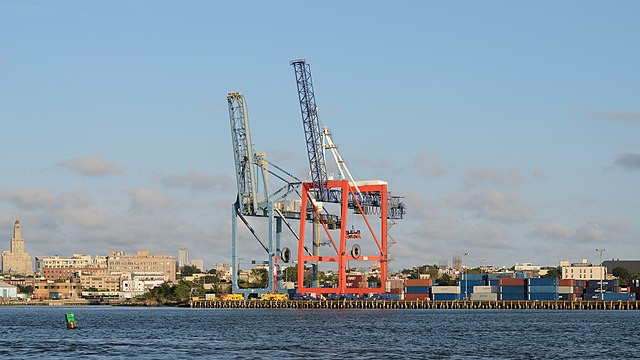U.S. East and Gulf Coast ports are on the brink of a significant disruption as the International Longshoremen's Association (ILA) prepares to initiate a strike at midnight on Monday. With no negotiations currently scheduled, the looming stoppage threatens to halt container traffic from Maine to Texas, potentially costing the economy up to $5 billion a day.
The labor contract between the ILA, representing approximately 85,000 port workers, and the United States Maritime Alliance (USMX) employer group is set to expire late Monday. Talks have reached an impasse over wage disputes and automation issues, with both sides accusing the other of refusing to negotiate in good faith.
"The USMX continues to block the path toward a settlement on a new Master Contract by refusing the ILA's demands for a fair and decent contract and seems intent on causing a strike at all ports from Maine to Texas," the ILA said in a statement released Monday morning. The union added that its members would "hit the picket lines at 12:01 a.m. on Tuesday, Oct. 1."
USMX officials have countered that the ILA is unwilling to engage in meaningful discussions. A person familiar with the matter, speaking on condition of anonymity due to the sensitivity of the negotiations, confirmed that no talks are planned before the deadline. The last coast-wide ILA strike occurred in 1977, making this potential shutdown a significant event for the nation's shipping infrastructure.
The stakes are high for businesses that rely on these ports, which handle about half of the nation's ocean shipping. According to data from ImportGenius, 54,456 twenty-foot equivalent units (TEUs) arrived on Friday at the 14 ports operating under the master contract, carrying goods valued at approximately $2.7 billion. "Importers, in coordination with their logistic partners, should try to clear as many of their containers off open terminals where possible to avoid possible delays in acquiring their inventory," said Alan Baer, CEO of logistics firm OL USA.
A prolonged strike could exacerbate inflationary pressures and disrupt supply chains ahead of the crucial holiday season. "These ports are also a major gateway into the U.S. for refrigerated produce. Time isn't on the side of importers," noted Michael Kanko, CEO of ImportGenius. Retailers like Walmart Inc., the nation's largest importer, have expedited shipments and employed backup plans to mitigate potential disruptions.
The potential strike places the Biden administration in a challenging position. While President Biden has emphasized his support for labor unions, a shutdown could have significant economic repercussions. On Friday, administration officials, including Transportation Secretary Pete Buttigieg and Acting Labor Secretary Julie Su, met separately with USMX and ILA representatives, urging both parties to "come to an agreement before Monday night's deadline."
Despite pressure from business groups like the U.S. Chamber of Commerce, which released a poll showing majority support for federal intervention, the administration has stated it will not invoke the Taft-Hartley Act to force workers back on the job. "We've never invoked Taft-Hartley to break a strike and are not considering doing so now," White House officials have said.
ILA President Harold Daggett has been vocal about the union's stance. In a recent video message to union members, he threatened an intentional slowdown if the government intervenes. "You're better off sitting down and let's get a contract and let's move on with this," Mr. Daggett said.
The dispute centers on wage increases and the use of automation at ports. The ILA has accused employers, including major shipping lines like A.P. Moller-Maersk A/S, of prioritizing profits over fair compensation. "The ocean carriers represented by USMX want to enjoy rich billion-dollar profits that they are making in 2024, while they offer ILA longshore workers an unacceptable wage package that we reject," the union stated.
Businesses across various sectors are bracing for impact. "Everyone will have the same problem," said Ash Bhardwaj, CEO of Onx Homes, which imports building materials through the Port of Miami. Steve Lamar, president of the American Apparel & Footwear Association, warned that a disruption would have "major impacts on the cost and availability of apparel, footwear, and travel goods."
Logistics companies are scrambling to move as much cargo as possible before the deadline. "Every importer, exporter, and even domestic shippers should be watching developments very closely this week," advised Brian Bourke, global chief commercial officer of Seko Logistics.
As the clock ticks toward midnight, the absence of scheduled talks suggests a resolution is unlikely before the strike commences. The potential economic toll is significant, with East Coast ports forecast to handle 2.3 million TEUs in October, translating to daily freight valued at over $3.7 billion. The coming days will reveal whether the two sides can bridge their differences or if the nation will face its first coast-wide port strike in over four decades.






